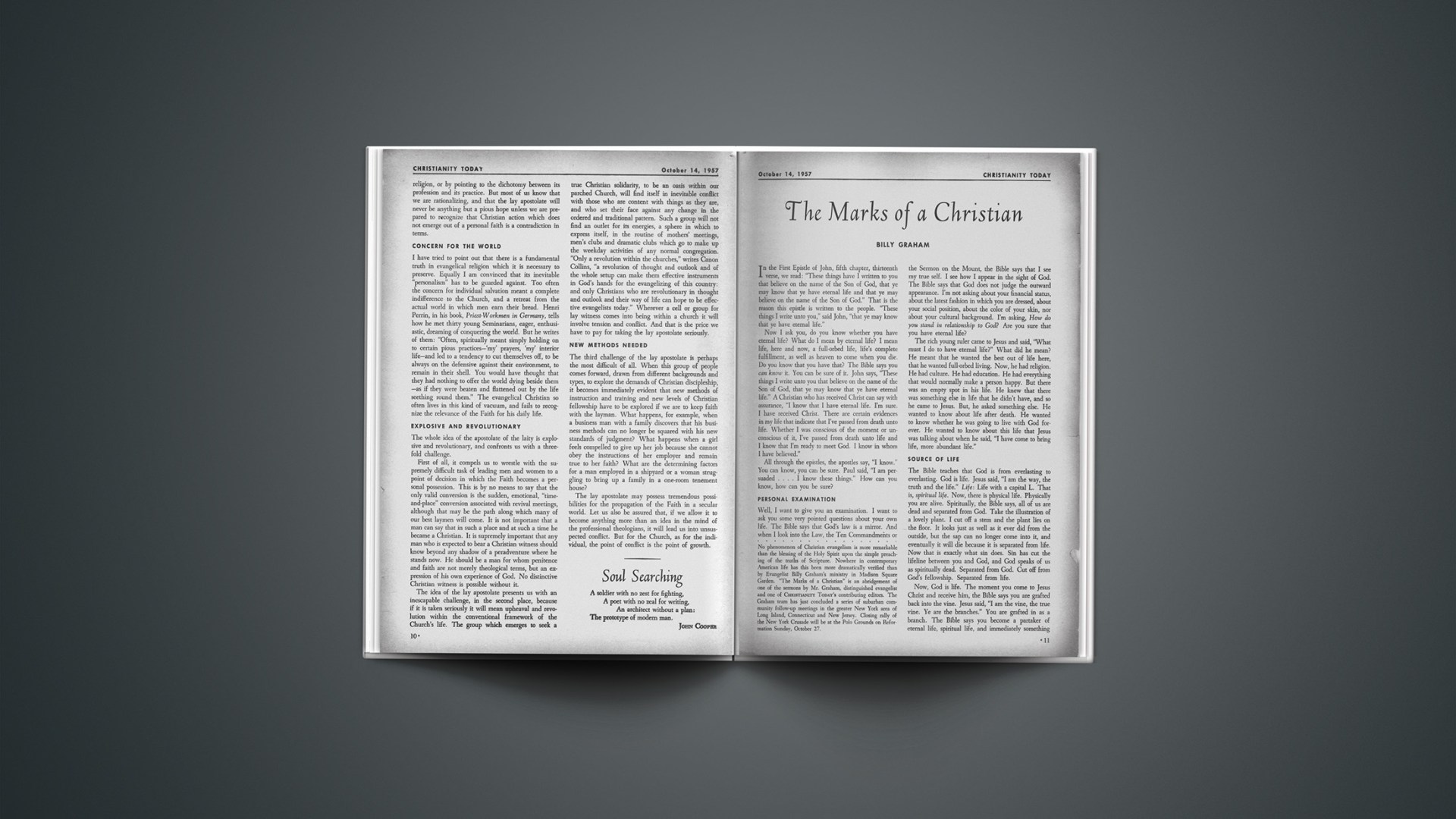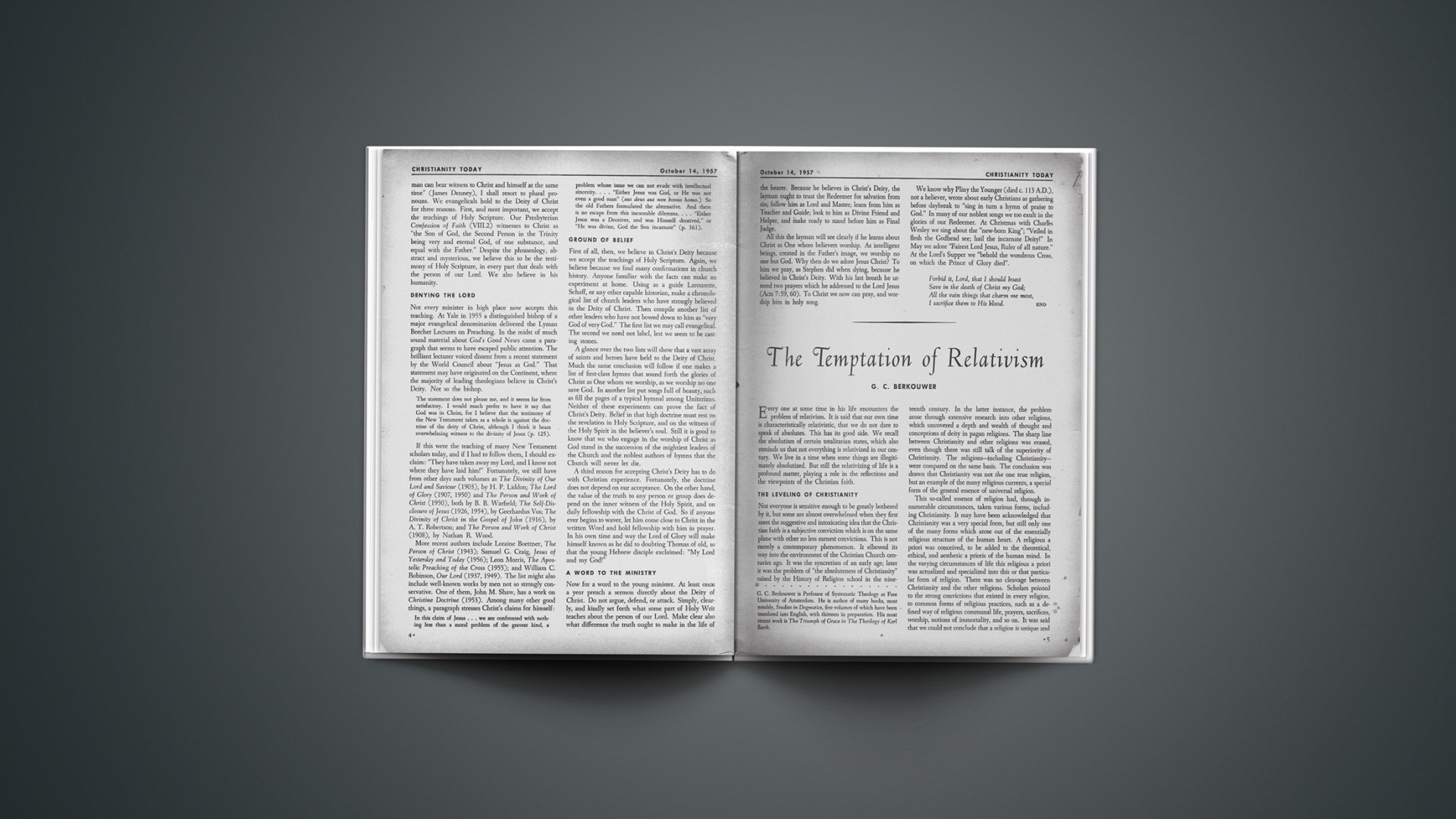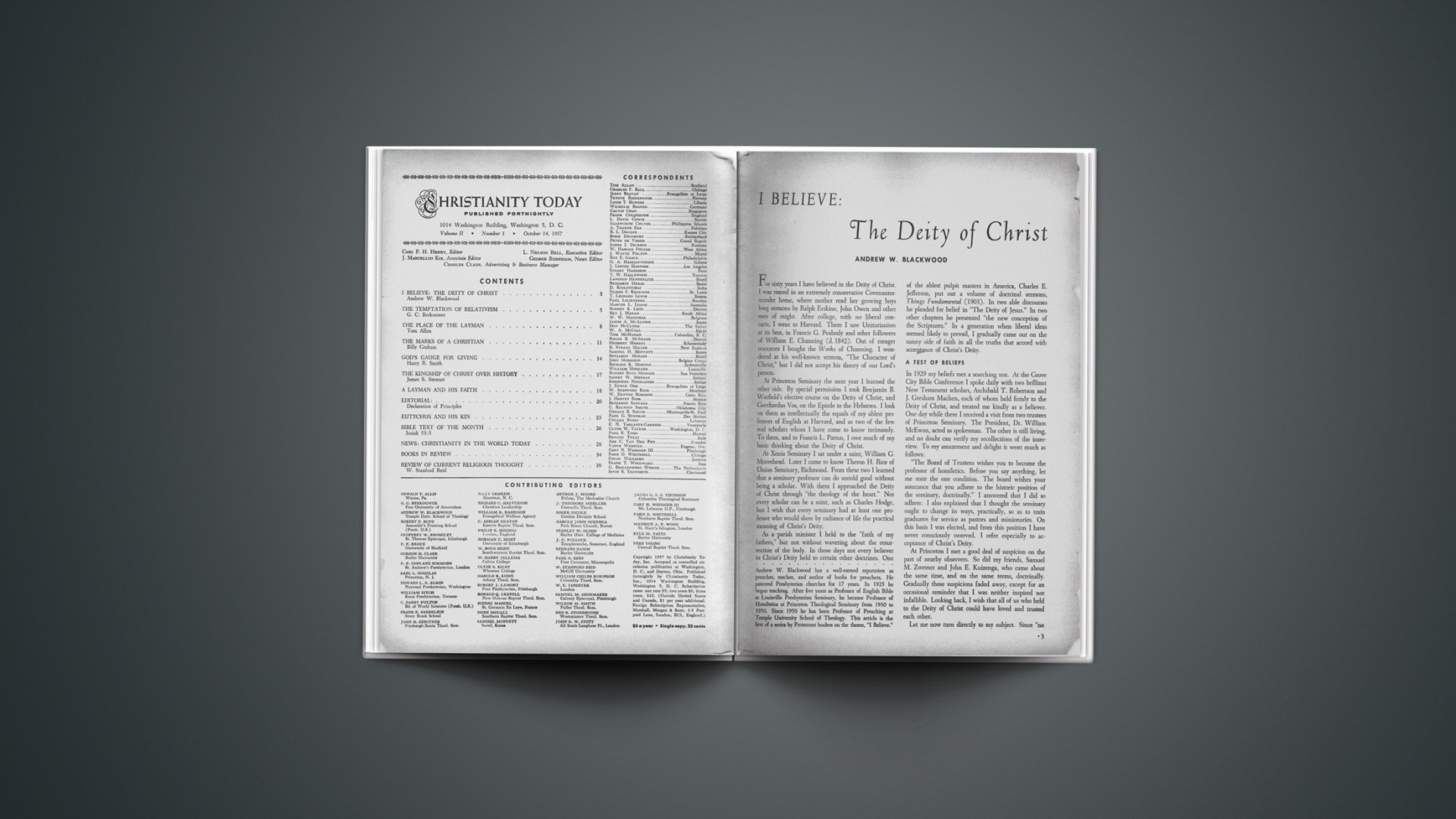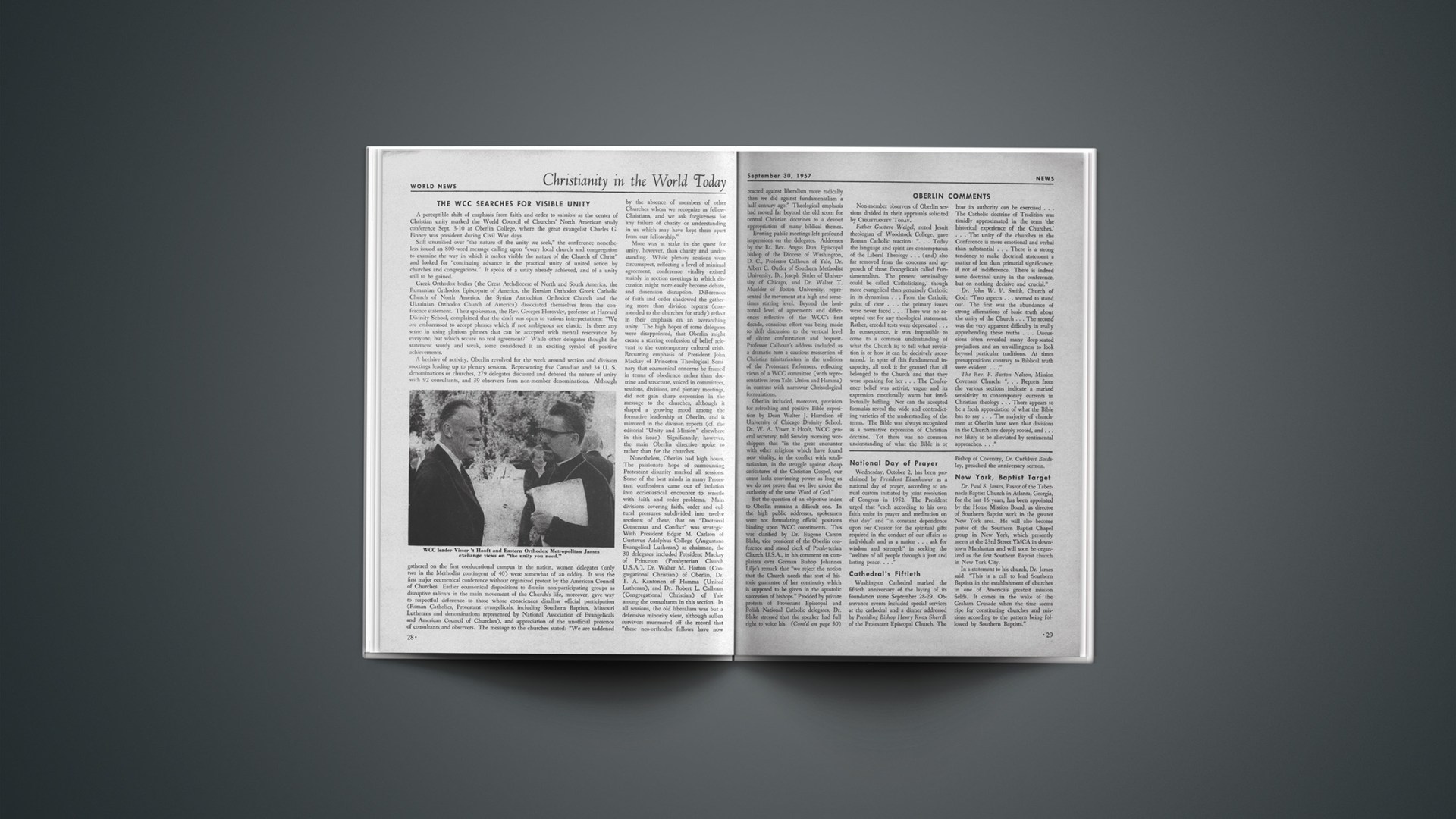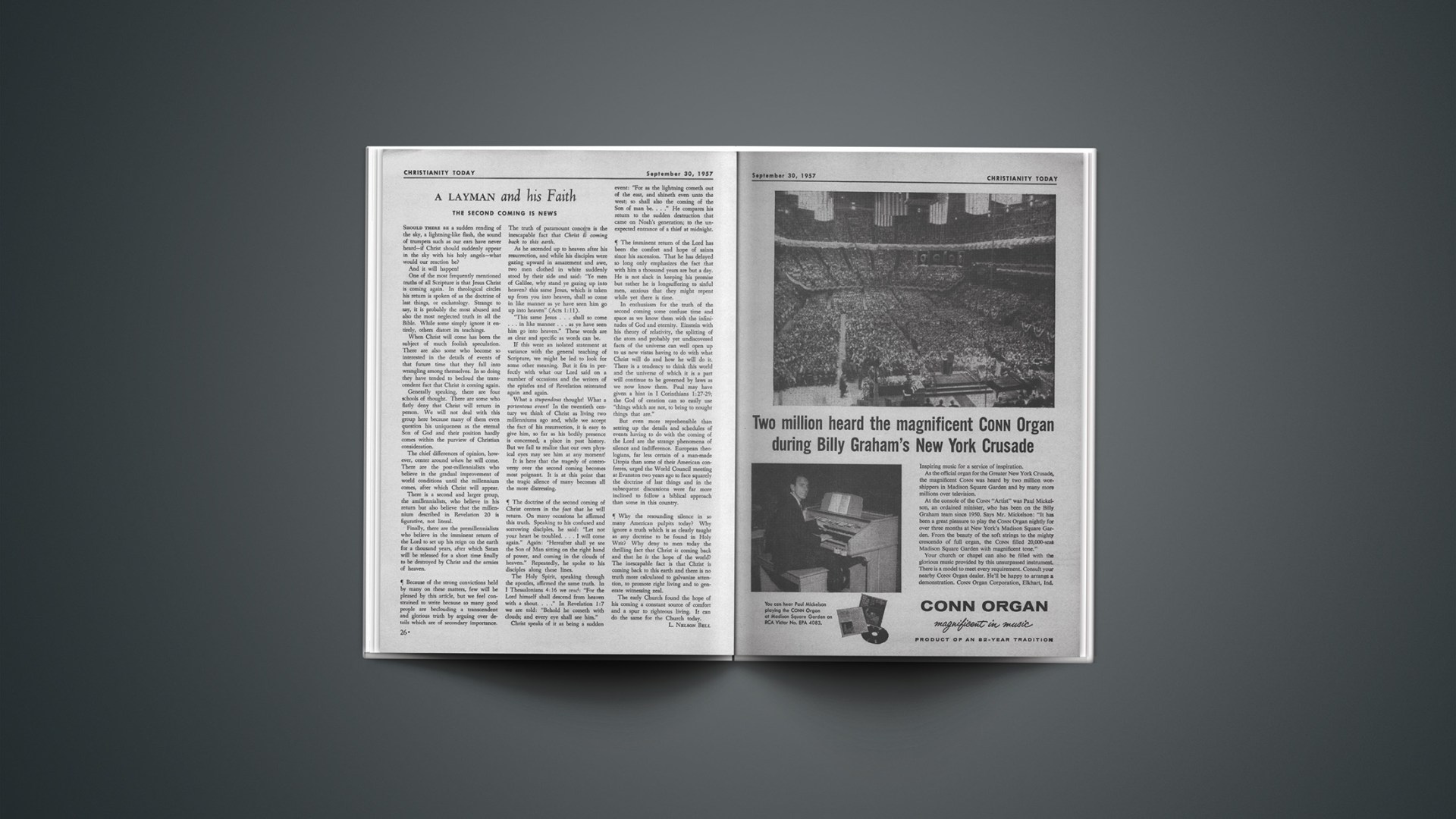Recently Professor Emile Cailliet of Princeton Theological Seminary wrote: “Experienced students of Christianity have pointed out that among Satan’s accomplishments the neatest of them all is that of persuading so many people that he does not exist.”
Truly the Devil has put over a fast one when he makes man either ignore or deny that he is the unceasingly active enemy of souls; the one who would constantly accuse us before God, telling him of our sins; the one who goes about as a roaring lion, seeking whom he may devour; the one who in Job is pictured walking up and down in the earth plotting man’s downfall; the one who wields great power in the earth and whose works are on every hand for all to see and whose activities are recounted in every morning and evening newspaper.
The Apostle Paul wrote a sharp letter to the Christians in Corinth because of flagrant sin which they had permitted to go unrebuked in their midst. Subsequently he wrote a second letter, taking note of their corrective action and then strongly admonished them to show Christian love toward the one who had repented lest Satan should use this to get advantage of them. Then Paul wrote: “For we are not ignorant of his devices.”
Both battles and wars have been lost because the enemy was underestimated or because faulty intelligence led to the wrong evaluation of his strategy.
Christians are in grave danger of waging losing battles because they are ignorant of Satan and his devices and in some circles today it is even popular to discount him entirely and deny his existence as a personality and relegate him to the realm of an evil influence only.
With the actuality of Satan himself there is also involved the mystery of evil itself. We all know that sin exists, we see its effects on every hand and we feel its urge in our own hearts and lives. The full implications of sin may be summed up in the statement that it is either a failure to conform to God’s law or a transgression of that law. And the Bible teaches that we all are sinners—by inheritance, by choice and by practice.
The Bible tells of Satan’s first intrusion into human history. He raised a question as to the truthfulness of God’s Word and then instigated a three-fold temptation involving the lust of the flesh, the lust of the eyes, and the pride of life, and man capitulated.
When Christ, the Second Adam, came he too was confronted by Satan with the same basic temptations, the eternally significant difference being that our Lord overcame the Devil by use of the Sword of the Spirit, the Word of God.
But Satan has never ceased in his work of luring men into the paths of sin. He attacks where we are weakest and his cunning is beyond human understanding.
The Apostle Paul, writing to the Christians in Ephesus, gives us a clear picture of what we are up against. He tells us that Satan is neither flesh nor blood, that our warfare is “against principalities, against powers, against the rulers of the darkness of this world, against wicked spirits in high places”. He then tells us that our one hope is to accept and use the armor God provides, taking also the shield of faith (movable against attacks from any quarter) and in our hand the one offensive weapon against which Satan cannot stand—the Holy Scriptures.
In the book of Zechariah Satan is pictured standing at the right hand of Joshuah the high priest to resist him and of his being rebuked by the Lord. (Zech. 3:1, 2). Again and again the Scriptures tell of his pernicious activities.… And he has never stopped.
What folly to ignore him! What a victory for him when his name is used in jest and in cursing and when “hell” and “damn” identify one’s conversation with Hell itself!
Not only does the Old Testament make recurring references to Satan but the same is true in the New. While his origin is clothed in mystery his ultimate end is told in the Revelation and this was made certain on the Cross of Calvary.
Cunning as he is Satan is not omniscient. He inspired Judas to betray his Lord and used men to denounce him, betray justice and crucify him and in so doing he insured his own ultimate destruction.
Today he tempts you and me to think and say and do things contrary to the will of God. Wherever the Gospel is preached he is there to snatch the seed from unwary hearts. Within the Church he scatters the tares of unbelief and sows the seeds of error where they grow side by side with the wheat. The wheat of true faith, and the tares of Satan’s planting will be separated by God’s holy angels at the end of time.
This enemy with whom we have to deal is not a repulsive character with horns and forked tail but often affects the guise of an angel of light. When clothed in the attractive habiliments of culture, wisdom and ethical righteousness, he can well deceive the most wary. He knows our own personal weaknesses and attacks at the most vulnerable spot and at the time our resistance may be at its lowest. Little wonder that man, in his own wisdom and by his own strength, is no match for this arch enemy of righteousness.
Only through spiritual blindness does man ignore the enemy with whom he has daily contact. His characterizations in the Scripture should alert us for he is spoken of as “accuser”, “adversary”, “enemy”, “father of lies”, “murderer”, “the power of darkness”, “the prince of this world”, “the power of the air”, “ruler of the darkness of this world”, “the spirit that worketh in the children of disobedience”, “tempter”, “god of this world”, “unclean spirit”, and “wicked one”.
Little wonder that our Lord when he revealed himself to Paul on the Damascus Road explained to the astonished man that his mission to his generation was to “open their eyes, and to turn them from darkness to light, and from the power of Satan unto God, that they may receive forgiveness of sins, and inheritance among them which are sanctified by faith that is in me” (Acts 26:18). Unregenerate man is held captive by the Devil and his works are on every hand for us to see. John bluntly tells us: “… the whole world is in the power of the evil one” (1 John 5:19).
This is a frightening picture and the complacency of men can only be explained in terms used by Paul: “But if our gospel be hid, it is hid to them that are lost: in whom the god of this world [Satan] hath blinded the minds of them which believe not, lest the light of the glorious gospel of Christ, who is the image of God, should shine unto them” (2 Cor. 4:3, 4).
Faced with such facts what can man do? It is here that the glory of the Gospel is manifested; for in Christ we have deliverance from the power of Satan and victory over him.
When we recognize the Enemy for who and what he is, and the One who gives us victory over him, we have left the kingdom of darkness for the kingdom of light, the realm of death for the realm of eternal life.
L. NELSON BELL





